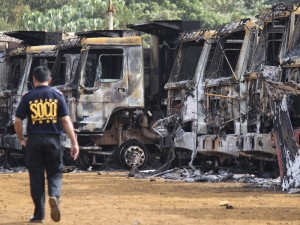
An investigator walks beside trucks that were allegedly burned by communist rebels at the compound of the Platinum Group Metals Corporation in Surigao del Norte province on Tuesday. AP
Australian and Japanese officials expressed concern Thursday over an attack by more than 200 communist guerrillas on three mining compounds in Surigao del Norte that destroyed trucks, equipment, barges and offices.
“It’s awful, I mean it’s not only the damage to the equipment but the damage to the reputation of the Philippines that I’m worried (about),” Japanese Ambassador to Manila Toshinao Urabe said.
Australian Ambassador Rod Smith, whose country also has mining interests in the country, expressed concern as well. Both diplomats welcomed government assurances that security for mining operations in remote areas would be improved.
Members of the New People’s Army disarmed guards, briefly held company staff, and torched company offices and heavy equipment during the attacks on Monday on three mines run by Nickel Asia Corp. and Platinum Group Metals Corp. in the province’s Claver town.
One of the companies, Taganito Mining Corp., was forced to temporarily shut down operations after the attack. The company is operated by Nickel Asia, the Philippines’ biggest nickel producer, which is partly owned by Japan’s Sumitomo Corp.
Urabe said about 60 Japanese workers building a smelting plant at Taganito were not harmed in the attack.
President Benigno Aquino III said he was disappointed with security officials in Surigao, where top police officials have been relieved from their posts following the attacks.
Mr. Aquino suggested that the risk of a major rebel attack was apparent but authorities failed to do anything. Additional forces had been deployed to improve security in the area, he said.
“The potential for a risk for a disaster was really evident,” Mr. Aquino told reporters. “I was not happy with their performance in this particular incident.”
The military has said rebel attacks on mining companies were part of extortion attempts.
Rebel spokesperson Jorge Madlos threatened more attacks if mining companies ignored their concerns.
The National Democratic Front in Northeast Mindanao, through a spokesperson identified as Maria Malaya, said the three mining companies were punished “for wanton indiscriminate mining operations in the mountains of Surigao del Norte that inflicted irreparable damage to the environment and natural resources.”
Presidential spokesperson Edwin Lacierda said the attacks were isolated but undermined peace talks the government was holding with the guerrillas. The government would pursue the talks despite the attacks, he said.
The Philippine Ecumenical Peace Platform, through its secretary, Caloocan Bishop Deogracias Iñiguez, said peace talks should continue because they would benefit all Filipinos.
“We hope that it will not be used to stall the peace talks between the Philippines and the National Democratic Front. The nation’s welfare and the general public should always come first. This should be enough reason to continue the peace talks with the communist rebels,” Iñiguez, concurrent chair of the Catholic Bishops Conference of the Philippines-public affairs committee, told reporters.
Lacierda also said that the government would look into the damage to the environment allegedly caused by the mining firms. He said Presidential Adviser on Environmental Affairs Nereus Acosta, who has been reported to have seen the damage caused by the mines, was certain to further assess the environmental issues. AP, with reports from Norman Bordadora and Jerome Aning
Originally posted at 09:15 am | Thursday, October 06, 2011

